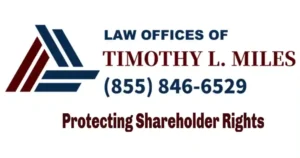Introduction to the Elevance Health Class Action Lawsuit
The Elevance Health class action lawsuit – captioned Miller v. Elevance Health, Inc., No. 25-cv-00923 (S.D. Ind.) – seeks to represent purchasers of Elevance Health, Inc. (NYSE: ELV) common stock and charges Elevance Health and certain of Elevance Health’s top executives with violations of the Securities Exchange Act of 1934.
If you suffered substantial losses and wish to serve as lead plaintiff of the Elevance Health class action lawsuit, or just have general questions about you rights as a shareholder, please contact attorney Timothy L. Miles of the Law Offices of Timothy L. Miles, at no cost, by calling 855/846-6529 or via e-mail at [email protected]. Lead plaintiff motions for the Elevance Health class action lawsuit must be filed with the court no later than July 11, 2025.
Read on to learn everything an investor needs to know about the notice process in a class action settlement.
Understanding the Notice Process When a Class Action Settles
When a class action lawsuit reaches a settlement, a crucial step in the legal process is the notification of affected individuals. This notice serves as a formal communication to inform potential class members about their rights, the nature of the settlement, and the actions they may take. Understanding this process is essential for anyone who may be impacted by a class action, such as those involved in the Elevance Health class action lawsuit.
What is a Class Action Lawsuit?
A class action lawsuit is a legal proceeding where a group of individuals collectively brings a claim to court against a defendant, typically a corporation or organization. This type of lawsuit is often pursued when the same issue affects a large number of people in a similar manner, allowing them to combine their resources and claims into a single action.
Key Characteristics of Class Actions
- Commonality: The claims of the class members must share common legal or factual issues.
- Numerosity: The group must be large enough that joining all members individually would be impractical.
- Typicality: The claims of the representative parties must be typical of those of the class.
- Adequacy: The representatives must adequately protect the interests of the class.
These characteristics ensure that the class action is a suitable method for resolving the claims of many individuals efficiently.
The Role of Notices in Class Action Settlements
Notices play a pivotal role in the class action process, particularly when a settlement is reached. They serve to inform class members about the settlement terms, their rights, and the steps they need to take.
Types of Notices
- Notice of Class Action Lawsuit: This initial notice informs potential class members about the lawsuit and their inclusion in the class. It outlines the allegations against the defendant and provides instructions on how to opt out if they choose to pursue individual claims.
- Legal Notice of Settlement: Once a settlement is proposed, this notice is sent to inform class members about the settlement terms, including compensation details and deadlines for filing claims or objections as will be done if their is a settlement in the Elevance Health class action lawsuit.
The Notice Process Explained
The notice process involves several key steps that ensure all affected individuals are informed and have the opportunity to respond. All individuals or entities who are class members in the Elevance Health class action lawsuit.
Step 1: Identification of Class Members
The first step in the notice process is identifying individuals who may be affected by the class action. This is typically done through discovery, where attorneys gather information about potential class members from the defendant’s records.
Step 2: Drafting the Notice
Once class members are identified, the next step is drafting the notice. This document must clearly outline:
- The nature of the lawsuit
- The allegations against the defendant
- The terms of the proposed settlement
- Instructions for filing claims or opting out
Step 3: Distribution of the Notice
After court approval, notices can be distributed through various methods, including:
- Direct Mail: Sending physical copies of the notice to identified class members.
- Email: Utilizing electronic communication for faster delivery.
- Publications: If class members cannot be identified, notices may be published in newspapers or online platforms to reach a broader audience.
Step 4: Court Approval
Before the settlement can be finalized, the court must approve the notice and the proposed settlement. This involves a fairness hearing where class members can voice their opinions or objections.
Understanding Your Rights as a Class Member in the Elevance Health Lawsuit
Receiving a notice related to a class action settlement means you have specific rights and options. It is crucial to understand these to make informed decisions. If you receive a notice after a proposed settlement in the Elevance Health class action lawsuit, you basically have three options
Right to Participate
Class members have the right to participate in the settlement. This typically involves filing a claim to receive compensation as outlined in the notice.
Right to Opt-Out
If you prefer not to be part of the Elevance Health class action lawsuit, you have the option to opt out. This means you can pursue your own individual lawsuit against the defendants. However, opting out also means you will not receive any benefits from the class action settlement in the Elevance Health lawsuit.
Right to Object
Class members can object to the proposed settlement if they believe it is unfair or inadequate. The notice will provide instructions on how to submit an objection, which will be considered during the court hearing and you are allowed to attend the hearing if you desire.
Important Deadlines to Remember
Notices will include critical deadlines that class members must adhere to. Missing these deadlines can result in losing the right to participate in the settlement or to opt out.
Common Deadlines Include:
- Claim Filing Deadline: The last date to submit a claim for compensation.
- Opt-Out Deadline: The final date to notify the court of your decision to opt out of the class action.
- Objection Deadline: The last date to submit any objections to the proposed settlement.
The Importance of Reading the Notice Carefully
It is essential for class members to read the notice thoroughly. The document contains vital information regarding your rights, the settlement terms, and the actions you may take.
Key Sections to Focus On:
- Settlement Terms: Understand what compensation is being offered and how it will be distributed.
- Instructions for Claims: Follow the provided steps to ensure your claim is filed correctly.
- Contact Information: Use the contact details provided for any questions or clarifications regarding the notice or the settlement process.
The Impact of the Elevance Health Class Action Lawsuit
The Elevance Health class action lawsuit is a significant case that highlights the importance of the notice process. Individuals affected by this lawsuit should pay close attention to the notices they receive, as they will outline their rights and options moving forward.
Background of the Elevance Health Lawsuit
This Elevance Health lawsuit involves allegations against Elevance Health regarding practices that may have harmed shareholders through false and misleading financial statements. As the case progresses, affected individuals will receive notices detailing the developments and any proposed settlements.
What to Expect Moving Forward
As the Elevance Health class action lawsuit unfolds, class members can expect to receive updates through notices. These communications will provide essential information about the status of the case and any actions required on their part.
Conclusion
The notice process in class action settlements is a critical component that ensures affected individuals are informed and can exercise their rights afforded to them under the Due Process Clause. Understanding this process, especially in the context of the Elevance Health class action lawsuit, empowers class members to make informed decisions regarding their participation in the legal proceedings. By carefully reading the notices and adhering to deadlines, individuals can navigate the complexities of class action lawsuits effectively.
In summary, whether you are a potential class member in the Elevance Health lawsuit or any other class action, being proactive and informed is key to protecting your rights and interests.
Frequently Asked Questions About the Elevance Health Lawsuit
What initiated the Elevance Health class action lawsuit?
The lawsuit was initiated by investors alleging that Elevance Health provided misleading information regarding its financial health and operations, resulting in financial losses.
How can I join the Elevance Health lawsuit?
If you purchased shares during the class period and suffered a loss, then you are automatically a member of the class and do not need to do anything at this point unless you are considering moving for lead plaintiff.
What are the potential benefits of a Elevance Health lawsuitt?
Class action lawsuits allow individual investors to collectively seek justice and compensation, which might be challenging to pursue individually. They also promote corporate accountability.
How long will the lawsuit take to resolve?
The duration of class action lawsuits can vary significantly, depending on the complexity of the case, legal strategies, and whether settlements are reached. It could take several months to years.
Contact Timothy L. Miles Today About an Elevance Health Class Action Lawsuit
If you suffered losses in Elevance Health stock, call us today for a free case evaluation about an Elevance Health, Inc.. 855-846-6529 or [email protected] (24/7/365).
Timothy L. Miles, Esq.
Law Offices of Timothy L. Miles
Tapestry at Brentwood Town Center
300 Centerview Dr. #247
Mailbox #1091
Brentwood,TN 37027
Phone: (855) Tim-MLaw (855-846-6529)
Email: [email protected]
Website: www.classactionlawyertn.com





